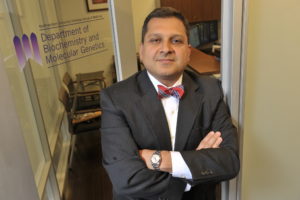$10 million gift creates Simpson Querrey Center for Epigenetics at Northwestern University Feinberg School of Medicine

A new $10 million gift from University trustees and supporters Louis A. Simpson ’58 and Kimberly K. Querrey will create a center at Northwestern University Feinberg School of Medicine to study the effects of environment on the activation and expression of genes.
The new Simpson Querrey Center for Epigenetics will investigate how environmental factors such as emotional experiences, chemical exposure, obesity, exercise, diet and drug therapies can modify genes packaged in human chromatin, causing them to become more or less receptive to new biochemical signals. Epigenetic modifications of chromatin can have a direct effect on the regulation of gene expression. Some of this regulation is good, and some of it causes disease.
“Through their exceptional support of the sciences at Northwestern, Kimberly and Lou are transforming our ability to understand, diagnose and treat disease,” said University President Morton Schapiro. “We are truly grateful for their continued partnership.”
The center brings together experts in biochemistry, molecular genetics, computational biology, fundamental biology, epidemiology and clinical medicine to develop foundational insights about how environmental conditions impact the human genome using sophisticated molecular, biochemical and computational methods. The Simpson and Querrey gift will support the center’s operations, seminar and symposium programs, pilot studies by Northwestern faculty and the new Feinberg Fellows in Epigenetics program. It will also provide funding for the recruitment of outstanding investigators in the area of epigenetics.

“Epigenetic-driven insights are proving fundamental to a myriad of diseases including cancer, heart, immunologic and neurological conditions,” said Eric G. Neilson, MD, vice president for medical affairs and Lewis Landsberg Dean. “Understanding the details of how individual genes, groups of genes and environmental factors work together to determine the human condition is at the forefront of medicine today.”
The center will be led by Ali Shilatifard, PhD, the Robert Francis Furchgott Professor of Biochemistry and Pediatrics and chair of the Department of Biochemistry and Molecular Genetics. Shilatifard’s work focuses on understanding the intricate chromatin mechanisms that regulate gene expression. This year, Shilatifard’s laboratory and his collaborators published several groundbreaking discoveries reporting the development of epigenetic targeted therapeutics for childhood leukemia, childhood brain cancer and adult triple negative breast cancer. One study on childhood brain tumors led to a Phase I clinical trial planned for next year at the Ann & Robert H. Lurie Children’s Hospital of Chicago.
“Words cannot describe my gratitude to Kimberly and Lou for their generous support of fundamental research from the epigenetic perspective of gene expression, and how perturbations of this process result in the pathogenesis of diverse human diseases,” said Shilatifard. “We will work very hard at the Simpson Querrey Center for Epigenetics, in collaboration with our colleagues across the medical center and on the north campus, to better understand the molecular basis of epigenetic regulation with an eye to developing targeted therapeutics for the treatment of diseases due to epigenetic abnormalities. These efforts, we expect, will lead to more personalized medicine and a better quality of life.”
“Solving the world’s biggest problems requires creativity and collaboration,” Querrey said. “At Northwestern, leading scientists are coming together to study not just the body but also the way the environment and our decisions affect our health. Lou and I are thrilled to be a part of this groundbreaking work.”
For more than a decade, Simpson and Querrey have consistently supported Northwestern. Through We Will. The Campaign for Northwestern, many new strategic initiatives have been made possible by their generosity, including the forthcoming Louis A. Simpson and Kimberly K. Querrey Biomedical Research Center, a 14-story, 600,000-square-foot building that will significantly expand Feinberg’s biomedical research enterprise. The current gift brings their total giving to $164 million.
More information on We Will. The Campaign for Northwestern is available at wewill.northwestern.edu






